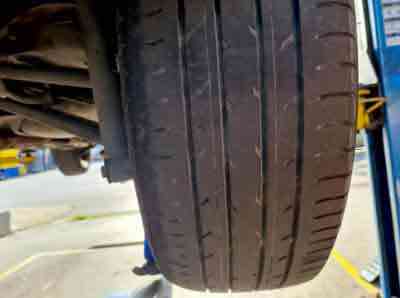Insurance does not cover payment for a tire falling off, however, insurance like the comprehensive coverage covers the resultant effect of tires falling off like rim damage, damage to the body of the car, or damages caused by potholes.

Also, if your tire blows out and causes damage to your vehicle and you have comprehensive coverage, you will then file a claim as comprehensive insurance covers damages for theft, repairs, and vandalism.
According to the insurance information institute, if there is collision coverage, collision insurance will cover the damage of your car and the tires too if you accidentally run over a large curb.
Table of Contents
What kind of insurance covers car tires?
Car insurance is often not the best way to cover tire damages as comprehensive and collision insurance seems not to cover all tire damages.
Tire warranties can be used in place of car insurance for certain damages. It is important to take a thorough look at the different kinds of warranties that cover car tires.
Some of these car warranties are only applicable to new tires while others have to be purchased for added tire protection.
Does Insurance Cover Tires
A tire and wheel insurance will protect your tire against material defects, wear and tear on tires, and road hazard, but most standard tires come with tire insurance from the manufacturers in this case you do not have to make full payment for a replacement.
Note that this insurance usually comes with an expiring date and it is rational to know the type of tire protection plans each warranty has.
Types of tire warranties
- Treadwear warranty
- Uniformity warranty
- Limited road-hazard warranty
- Trial period warranty
- Materials warranty
Treadwear warranty
This is the commonest type of mileage warranties and it is most typical with a tire.
This coverage is normally for a certain number of years or miles say five years or 50,000 miles.
To be qualified for a claim, the tire must wear down totally and the thread must measure 2/32 of an inch or even less.
For this, the tire is unsafe for driving once it’s at this measurement. The manufacturer then allocates the remains of the mileage owed to you and then makes attempts towards purchasing a new set of tires.
Uniformity warranty
This warranty is also known as ride uniformity insurance. Its coverage is on ride quality.
For instance, if you notice your tire causes shaking and bumping while driving, it is up to the manufacturer to replace the tire.
However, this type of tire insurance is relatively rare as ride defects do not occur all the time.
Typically it lasts for 30 days to 1 year as you will notice this issue with a newly purchased tire rather than an old one.
Limited road-hazard warranty
Limited Road protection is also known as road-hazard. It helps pay for the cost of a tire repair or replacement after an incident has taken place. Examples of road hazards are potholes, wood, nails, etc.
Sidewalks, walls, and curbs are not considered road hazards, meaning that, if you were to damage your tire by jumping a curb, then road-hazard coverage will not take responsibility for the cost to fix it.
This program usually covers the tire’s first year.
Trial period warranty
Manufacturers sometimes allow users to try out a set of tires for a certain period of time.
If the tires are returned when the trial period ends, you may receive a full refund to acquire a new set of tires. This warranty period lasts for about 30 to 45 days.
Materials warranty
This is another common type of car tire warranty, also called workmanship warranty. Its coverage is for material defects that may have taken place during the manufacturing process.
The manufacturer will be responsible for payment for claims made before the thread wears off.
The claim amount will be given to help pay for a new set of tires. For you to make a claim on a material warranty, you would have proof that the tire is not worn down during usage or maintenance which is likely difficult to prove.
Will insurance cover slashed tires?
Yes! It depends on the type of insurance coverage you have and how your tire was damaged.
Comprehensive insurance and collision insurance services cover slashed tires.
If there is comprehensive coverage protection, car damages will be on theft, repair and vandalism basically, slashed tires are considered a type of vandalism.
Collision coverage is responsible for payment of repairs of cars if damaged in a collision with another car.
Basic car insurance or liability auto insurance coverage will certainly not cover the damages of slashed tires regardless of the cause.
Will insurance cover tire damage?
Car insurance may partially cover tire damage depending on your insurer and state.
Insurance doesn’t cover flat tires, tire damage from normal wear and tear, these are covered by the manufacturer’s warranty or you can purchase a tire protection plan if you need more coverage for your tires.
If you have collision and comprehensive coverage, then you’re automatically covered for tire damage if it’s caused by an accident or unexpected event.
Collision or comprehensive coverage will cover the repair cost for the tire damage if you get into an accident with another car, thieves get to steal your rims or tires, you have driven over a bad road or pothole, or when vandals slash your tires.
What to do before you can claim your insurance for car tires

If you detect your tire damage, you should choose to file a claim as quickly as possible.
First, your insurer will be aware that something happened, and you won’t pass over the claim deadline, which can render your claim to be ineffective.
Two things are concerned right here as well and you should take note of them before you can claim your insurance for your car tire;
Firstly, What caused the damage? And secondly, your insurance format deductible.
Tire damage can be caused by bad roads or potholes, even at a low speed it could harm your tire and a high speed can cause even more damages.
Look for any visible damages to your tire and wheels, check for any vibration when you’re driving, check if your steering doesn’t stay properly or if the car tires pull to one side.
If your tire damage resulted from vandalism or any different incidents like bad roads or potholes like I have mentioned before or hitting of inanimate objects or just by driving into curbs, you should file a police record formally before filing an insurance plan claim.
Through the police report, you will have more information to share with the insurance enterprise to make you declare respectable and accessible to approve.
You may additionally use the police record to file a vandalism or theft claim.
On second thought, if the fee to replace your damaged tire is very less than your insurance deductible, you shouldn’t be needing any reason to file a claim.
This is due to the fact it will be easier for you to pay for a new tire alternatively out of your pocket than file an insurance plan claim.
But, as long as you are qualified for a claim, then you can proceed to file the claim. Never let the thought of a claim that will make your insurance premiums increase discourage you from claiming your damaged tires from your insurer.
It is good that you make a report of the incident and file the claim than ignore an incident unreported.
Let the insurance plan insurer inform you whether or not you are qualified for the reimbursement.
In terms of manufacturer warranties, you have the right to file a warranty claim if your tire wears out before the expiring date.
Tire manufacturers offer thread wear warranties, when a tire wears out before the warranty expires, then you are qualified for a replacement under the treadwear warranty.
Note that, you’ll need to show proof of purchase and proof that you rotated the tires appropriately at the given intervals to claim your warranty.
What would cause a tire to come off while driving?
Anything that loosens your tire can cause it to fall off; Some of the most frequent causes include:
- Broken hubs
- Fastening failures
- Loose lug nuts
- Axel failures
- Errors in the manufacturing process
- User error
- Error from technician or repair shop
Broken hubs
Bad or broken hubs create hazardous conditions such as making a tire come off while driving especially at high speed.
Fastening failures
Bolts might not be secured tightly during service or manufacturing, sometimes this failure occurs when the bolt’s thread is stressed giving gaps between the threads that enhance rotation.
In the case where a nut that is too big to fit the bolt, it will eventually lead to a tire falling off
Loose lug nuts
The lug nuts of a car are an essential part that a lot of users ignore. The lug nuts hold the wheels to the car’s hubs.
If loose, the wheel held by the lug will come off of the hub while the car is in motion.
Axle failures
Hitting bumps or potholes, overloading; when the car weights exceed the axle, this can lead to a tire coming off when driving as the axle has a connection power from the engine to the tires.
Errors in the manufacturing process
The process with the design of the tire can also lead to a tire falling off and it could be possible to find errors in the most defective part of a tire, from the lug nuts, axel, or hub.
These errors are traced back to the manufacturing process, either the fault is from the workers; lack of supervision, or directly from the machine.
User Error
Just when a driver fails to properly tighten and secure a lug nut while charging a tire.
This can lead to a tire getting loose and falling off while driving, as a driver, undergoing personal repairs without having any mechanical experience can be very dangerous.
Once you notice any unusual signs it is advisable to take your vehicle to a technician or repairer shop for proper repair or maintenance.
Error from technician or repair shop
A technician can also be blamed for a tire falling off, an inexperienced or unprofessional one mostly will not know the specific requirements regarding which took to use when putting on a tire or the necessary amount of tightening that will do when replacing a tire or wheel nuts.
This blame could sometimes involve the vehicle dealer, mechanic, or another driver.
Conclusion
Every car owner has experienced these unexpected scenarios: you take your eyes off the road for a second and you accidentally hit a curb, vandals slashing your tires, your car tires getting stolen, you walk out to your car only to see a flat tire.
And you may be wondering if your insurance policy is responsible for the cost of repairs or to replace them.
In some cases, it’s a yes while in others no.
Always have it in mind that tire wear and tear is never covered by car insurance.
This insurance will not compensate you if your tires get flats because of wear and tear, they mostly cover unexpected events that are out of the driver’s control.
If your insurance policy has comprehensive and collision coverage then your car tires are partially covered, collision insurance covers the repair and replacement of cars by an accident with another car.
Comprehensive insurance will pay or replace your car if someone steals or damage it during noncollision activities.
It is advisable to purchase tire protection for more coverage. Road hazards such as potholes, nails, glass, etc. that cause damages to tires are usually covered.

